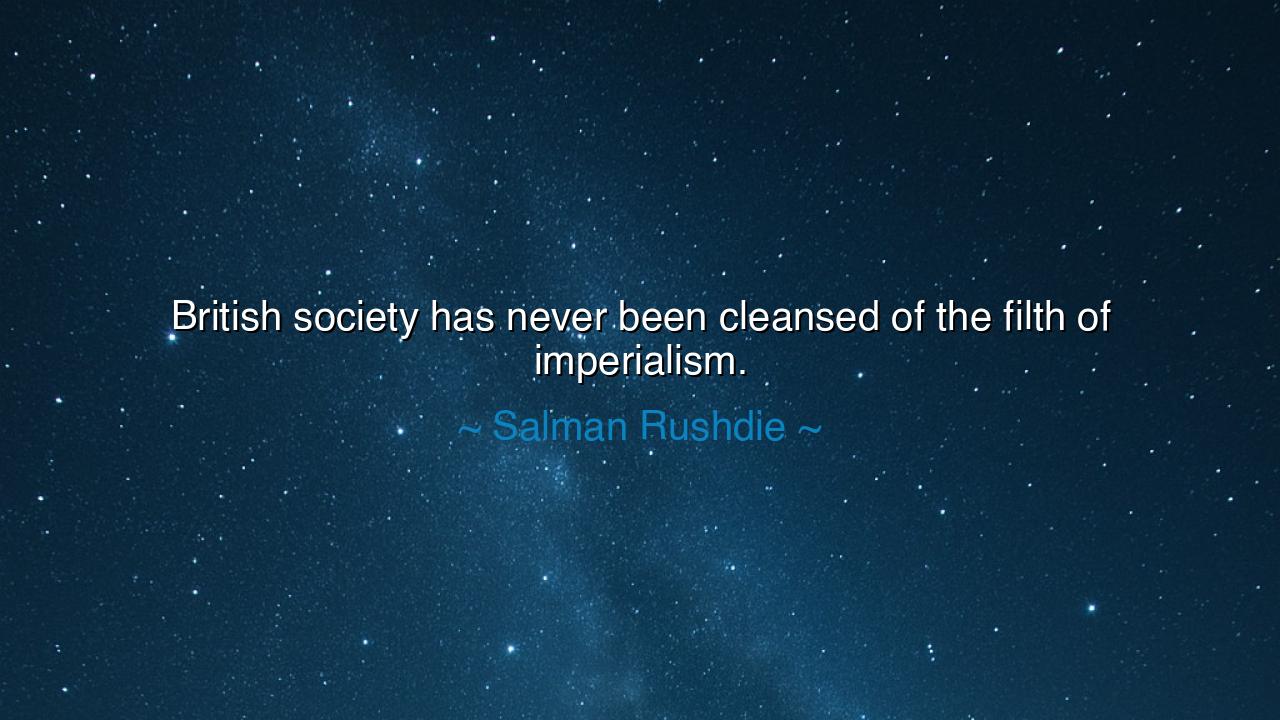
British society has never been cleansed of the filth of






Hear the words of Salman Rushdie, whose pen has long been both sword and shield, who declared: “British society has never been cleansed of the filth of imperialism.” These words burn with the fire of memory, for they remind us that the past is never fully past, and that the crimes of empires do not vanish with the lowering of their flags. The wealth of nations, the pride of culture, the very institutions of order—these were built on conquest, domination, and the subjugation of others. And though the empire may have crumbled, its shadow lingers, woven into the very fabric of daily life.
For imperialism was not only the seizing of lands and treasures, but the shaping of minds and systems. It carried with it arrogance, the belief that one people had the right to rule over others, that their values were supreme, their culture superior, their power ordained. This poison did not disappear when colonies won their independence; it seeped into laws, education, and even into the unspoken assumptions of society. Rushdie reminds us that until these poisons are confronted and purged, their stain remains.
History offers us countless mirrors of this truth. The riches that built London, that adorned its palaces and filled its coffers, were drawn from India, Africa, and the Caribbean. The railways and trade routes of empire were not benevolent gifts but instruments of exploitation, designed to carry away wealth while leaving behind famine and division. Even after independence, nations like India bore scars of partition, famine, and cultural suppression. And in Britain itself, the echoes of this history live on: in the way immigrants from former colonies were treated, in the persistence of racial prejudice, in the lingering pride in the so-called “glories” of empire.
Consider the Windrush generation—men and women from the Caribbean who came to rebuild Britain after the Second World War. They labored in hospitals, factories, and transport, carrying the weight of a nation not their own. Yet decades later, many were treated as strangers, denied their rights, and cast out as though their sacrifices meant nothing. Is this not the residue of imperialism, the failure to cleanse society of the arrogance that once ruled colonies with disdain? Rushdie’s words strike at this wound: the empire may be gone, but the mindset lingers.
But let us not think this truth applies only to Britain. Every empire—Roman, Ottoman, Spanish, French—has left behind this same inheritance. The victors of old carried their glory into the present, while the conquered carried their scars. The lesson of Rushdie’s cry is universal: until a society reckons honestly with its past, it cannot be cleansed of its corruption. To deny the blood that built one’s foundations is to live upon rotting ground.
The meaning, then, is not simply accusation but warning. To cleanse the filth of imperialism is not to erase history, but to confront it, to teach it truthfully, to repair what can be repaired, and to honor those who suffered. It is to build a future that does not glorify domination but seeks justice and humility. Without this work, society remains chained to illusions of superiority, repeating the same patterns under new guises.
The lesson for us all is clear: do not turn away from the uncomfortable truths of history. Read them, speak them, teach them to your children. When you see prejudice, arrogance, or exploitation, recognize in them the echo of empire, and resist. Support those whose voices have long been silenced, and strive to build relationships not of domination but of equality.
Thus remember Rushdie’s words: “British society has never been cleansed of the filth of imperialism.” Let them ring not as condemnation alone, but as a call to purification. For every nation bears its shadows, and only by facing them can it step into the light. Cleanse the memory, cleanse the spirit, and build a society that honors not conquest, but compassion; not exploitation, but justice; not arrogance, but truth.






AAdministratorAdministrator
Welcome, honored guests. Please leave a comment, we will respond soon